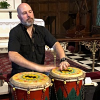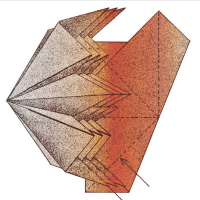Home » Jazz Articles » Album Review » Ches Smith / We All Break: Path of Seven Colors
Ches Smith / We All Break: Path of Seven Colors
Path of Seven Colors is a two-disc set, the first being a re-release of the debut, now retitled as 2015, the year in which it was originally recorded. Smith teamed with percussionist Markus Schwartz whose background included groups playing a Voudou/jazz hybrid. Another of Smith's mentors, Daniel Brevil, is the third percussionist on 2015, and all three supply occasional vocals. Smith's choice of Matt Mitchell's piano is a brilliant stroke of intuition even though Mitchell also lacked specific experience in voudou music. On the second disc, 2020, the quartet is joined by a fourth percussionist/vocalist, Fanfan Jean-Guy Rene, saxophonist Miguel Zenon, bassist Nick Dunston, and vocalist Sirene Dantor Rene.
2015 is a churning triumph of polyrhythms, polytonality, and improvisation. It would be counter-productive to analyze each of the seven Smith compositions given the percussive nature of each; even Mitchell's spikey piano is as much a propulsive force as the drums. Smith's pieces are rooted in the traditions of the African diasporic religion and further developed as Voudou in Haiti beginning in the 1500s. Schwartz and Brevil each play tanbou and rada, barrel drums used across music genres of Haiti, and Smith adds the native kata drum. Each of the percussionists contributes vocals in Haitian Creole, with lyrics written or procured by Brevil. In the tonal exchanges of various drum tunings, piano, and voices we hear enthralling textures and revelations.
Miguel Zenón's saxophone brings a different feel to the 2020 disc, less stark, more rounded by the alto. More along the lines of Afro Cuban traditions and modern improvisation, these pieces generate an alternative kind of exhilaration. "Woule Pou Mwen" finds inspiration in the ritualistic music of the Congo, as does "Leaves Arrive." The latter piece shares its influence with the rhythms of the Haitian petwo tanbou drummers. The politically inclined "Women of Iron" has its inspiration in the Haitian war for independence, a successful insurgency by self-liberated slaves against French colonial rule.
Smith's career has been dominated by sideman and co-leader projects. His work with Craig Taborn, Tim Berne's Snakeoil, Marc Ribot, and the Mary Halvorson Trio, has been widely praised. It is fortunate for creative music that his scarcer leader outings are such great achievements. The "break" in We All Break refers to the Haitian Creole word—kase—for a sudden alteration in the music introduced by the principal drummer. And just as Vodou drumming rituals call upon abstract ancestral spirits, Smith crafts his arrangements with an appropriate level of uncertainty. He breaks new ground with We All Break, and with no template for this hybrid model, he has created something new and extraordinary. Highly recommended.
Track Listing
2015: An Opening; Reds; Country Line; Dagger; Ibo; Notions of Purity; Six A.M.
2021: Woule Pou Mwen; Here's The Light; Leaves Arrive; Women of Iron; Lord of Healing; Raw Urbane; Path of Seven Colors; The Vulgar Cycle.
Personnel
Ches Smith
drumsMatt Mitchell
pianoMiguel Zenon
saxophone, altoDaniel Brevil
percussionMarkus Schwartz
percussionNick Dunston
bassSirene Dantor Rene
vocalsFanfan Jean-Guy Rene
percussionAlbum information
Title: Path of Seven Colors | Year Released: 2021 | Record Label: Pyroclastic Records
Tags
PREVIOUS / NEXT
Ches Smith Concerts
Support All About Jazz
 All About Jazz has been a pillar of jazz since 1995, championing it as an art form and, more importantly, supporting the musicians who make it. Our enduring commitment has made "AAJ" one of the most culturally important websites of its kind, read by hundreds of thousands of fans, musicians and industry figures every month.
All About Jazz has been a pillar of jazz since 1995, championing it as an art form and, more importantly, supporting the musicians who make it. Our enduring commitment has made "AAJ" one of the most culturally important websites of its kind, read by hundreds of thousands of fans, musicians and industry figures every month.


























